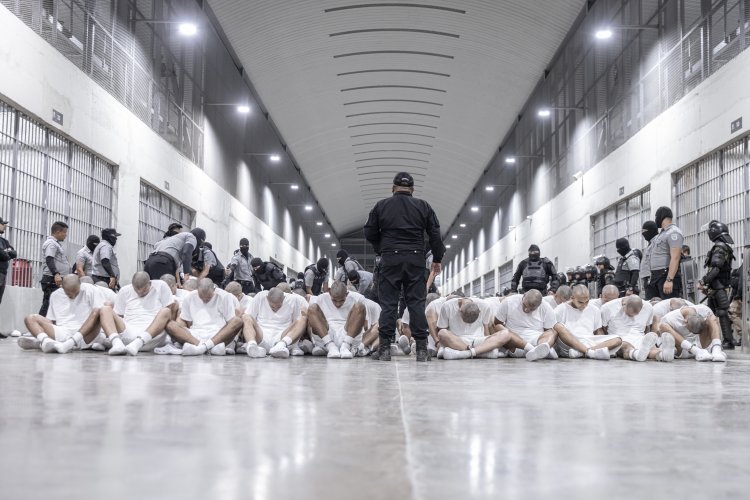Following significant Supreme Court criticism, Trump administration condemns 'meritless litigation'
The statement from the White House arrives amid a wave of backlash directed at the Trump administration by Democrats and legal experts concerning issues related to due process and the rule of law.

This pushback against the legal challenges and the Trump administration’s assertions of adhering to the rule of law coincides with intense criticism from Democrats and legal experts. Many have accused President Donald Trump of igniting a growing constitutional crisis that jeopardizes immigrants' due process rights across the nation.
“We are confident in the lawfulness of the Administration's actions and in ultimately prevailing against an onslaught of meritless litigation brought by radical activists who care more about the rights of terrorist aliens than those of the American people," White House press secretary Karoline Leavitt stated to PMG.
The White House's comments came over 12 hours after a significant defeat for the administration at the hands of the Supreme Court. In a surprising 7-2 ruling, the Court mandated a pause on the deportation of a group of Venezuelan men in north Texas. This decision followed urgent action from the ACLU, which argued that the administration was violating due process by notifying immigrants of their "imminent" removal with insufficient time to contest it. Justices Samuel Alito and Clarence Thomas expressed their dissent.
The ruling was notable, being announced early on Saturday, just hours after a legal challenge was initiated by attorneys representing the migrants. The rapid nature of the Court's decision was such that some lower courts had yet to respond, and the government had not submitted its arguments. Alito’s dissent was only referenced as “to follow,” as it had not been released by Saturday afternoon.
Following the White House's statement, the Justice Department filed a response to what it labeled an "unprecedented injunction" from the Supreme Court. The DOJ highlighted that a lower appeals court had dismissed a motion from the ACLU as premature and noted that the immigrant group in north Texas had not yet been classified as a class.
Solicitor General D. John Sauer's filing urged the Court to clarify that its order does not prevent the administration from deporting the Venezuelan detainees in Texas under alternative legal authorities apart from the AEA.
Democrats characterized this ruling as a victory, arguing that the Supreme Court prevented illegal deportations and constrained what Illinois Rep. Delia Ramirez referred to as an “out of control” Trump administration from removing immigrants on less than 24 hours' notice.
“These men were in imminent danger of spending their lives in a horrific foreign prison without ever having had a chance to go to court,” ACLU attorney Lee Gelernt stated on Saturday. “We are relieved that the Supreme Court has not permitted the administration to whisk them away the way others were just last month.”
This ruling reflects the escalating conflict between Democrats and Republicans regarding how the Trump administration plans to enforce court decisions and uphold the rule of law.
Trump has increasingly criticized lower court judges for executing nationwide stays on his immigration initiatives. He has specifically targeted U.S. District Court Judge James Boasberg, who mandated the administration to halt deportation flights during the first AEA deportations in March, as well as higher courts that have obstructed his policy.
Leavitt's statement from Saturday did not single out any Supreme Court justice, despite Trump's past criticisms of justices who ruled unfavorably against him. While only Alito and Thomas publicly dissented, it's likely that all three justices nominated by Trump during his first term—Brett Kavanaugh, Neil Gorsuch, and Amy Coney Barrett—also sided against him in this decision.
Interestingly, many of Trump’s typically vocal communications staff have remained quiet on social media following the ruling. However, Paul Ingrassia, the White House liaison for the Department of Homeland Security, did express disapproval of the U.S. judicial system, claiming that the Supreme Court is actively working against the president and is “infected with a parasitical ideology that denies reason and common sense.”
“The judges in law courts today, including the majority in the nation’s Highest Court, have absolutely no understanding of law and its proper function and role,” Ingrassia remarked, targeting the Supreme Court’s conservative justices who were appointed by Trump.
Democrats and legal experts have accused the administration of undermining the rule of law by defying a prior Supreme Court directive to “facilitate” the return of a Salvadoran national, Kilmar Abrego Garcia, who had been illegally deported, as well as a district court order requiring the halt of deportation flights in March.
In court filings, the administration claimed that Abrego Garcia’s deportation was due to an “administrative error,” citing an active court order that prevented his removal to El Salvador due to fears of persecution. Trump and his aides have asserted their belief that Abrego Garcia will remain in El Salvador.
This week, top Trump officials criticized Democrats for supporting Abrego Garcia, framing them as endorsing an alleged MS-13 gang member while Trump emphasizes his administration’s focus on protecting families who have faced violence from undocumented immigrants. A federal judge had previously noted that the government’s evidence against him being a gang member was weak.
“If he tattoos like MS-13, beats women like MS-13, and tramples the law like MS-13—THEN HE’S PROBABLY MS-13,” the White House declared on X on Saturday. Other accounts linked to Trump, including Trump’s War Room, began to rally around the messaging of “DeMS-13.”
In the wake of Saturday’s ruling, some of Trump's devoted supporters have begun to question whether the administration should adhere to Supreme Court orders and permit immigrants to undergo individual trials. An April 7 Supreme Court decision, which vacated prior lower court actions blocking deportations under the AEA, specified that all individuals identified as “alien enemies” must receive notice and sufficient opportunity to contest their deportation in court.
Yet, Trump supporter and billionaire Bill Ackman argued that requiring courts to individually examine the cases of millions of immigrants could lead to a loss of the values that define the nation's democratic system.
“This is the hard truth,” Elon Musk—billionaire Tesla CEO and special advisor to Trump—agreed with Ackman on X, with some congressional members also sharing Ackman's view.
Stephen Miller, a prominent Trump advisor, expressed skepticism on Saturday about the nature of due process for these migrants under a second Trump administration, while sharing posts that questioned how judges could inhibit what has been labeled Trump's electoral mandate to enforce deportations.
“We live in a society where foreign alien terrorists have unlimited free legal representation,” Miller noted on X. “But Americans whose communities have been stolen from them are left without recourse. We are rebalancing the scales.”
Trump has previously stated his intention to comply with court orders while also challenging the extent of judicial authority over his executive powers concerning immigration. His administration argues that courts lack the ability to compel him on matters of foreign policy.
"We're getting them out. And that's why I was elected. A judge wasn't elected to do that — I was elected to do that. And we're doing it in record fashion,” Trump told reporters on Friday.
Debra A Smith for TROIB News












